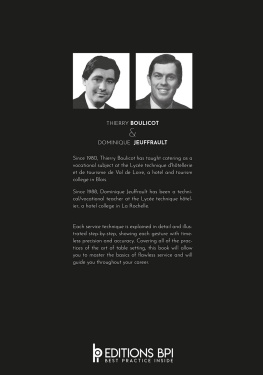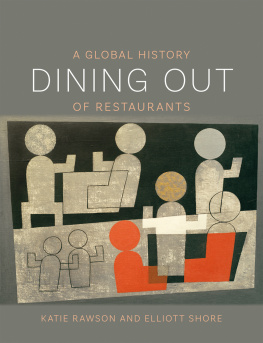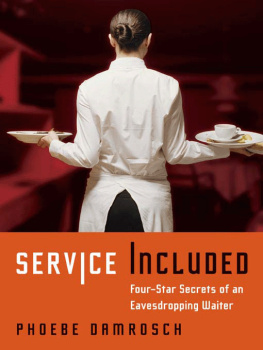PUBLISHING DIRECTOR: Sarah Lavelle
CREATIVE DIRECTOR: Helen Lewis
EDITOR: Susannah Otter
DESIGNER: Katherine Keeble
COVER PHOTOGRAPHY: Chris Terry
WRITING CONSULTANT: James Steen
PRODUCTION CONTROLLER: Nikolaus Ginelli
PRODUCTION DIRECTOR: Vincent Smith
Published in 2017 by Quadrille, an imprint of Hardie Grant Publishing
Quadrille
5254 Southwark Street
London SE1 1UN
www.quadrille.com
Text Fred Sirieix 2017
Design and layout Quadrille Publishing Limited 2017
Photography Chris Terry 2017
The rights of the author have been asserted. All rights reserved. No part of the book may be reproduced, stored in a retrieval system or transmitted in any form or by any means, electronic, electrostatic, magnetic tape, mechanical, photocopying, recording or otherwise, without the prior permission in writing of the publisher.
Cataloguing in Publication Data: a catalogue record for this book is available from the British Library.
eISBN: 978 1 78713 205 4
NOTE TO READERS: some names and identifying details have been changed.
EXCELLENCE IS AN ART WON BY TRAINING AND HABITUATION. WE ARE WHAT WE REPEATEDLY DO.
Aristotle
To my children Andrea and Matteo Lucien
To my parents Claude and Franoise Sirieix
To my brother Pierre
CONTENTS
I still remember when Fred started working at Le Gavroche as a young waiter, fresh out of catering college and with a typical French I-know-best attitude. Answering back and being a little gobby can get you into trouble, especially when youre a new member of staff. However, Fred was, and remains, exceptional. Even as a young waiter, his talent was evident and he reinforced this with a boundless drive and energy.
There was never a dull moment with Fred. His speed of thought meant that he was always one step ahead of everyone, which annoyed some of the older members of staff and very occasionally, I had to step in to calm the tension.
Fred was destined for greatness, and he climbed up the ladder at Le Gavroche very quickly. Silvano, our matre d at the time, immediately saw his talent. Even if a little rough around the edges, it was there, plain for us to see. My father remarked several times how good he was at surveying the room and how professional he was, but he wished Fred would slow down as his perpetual movement was making him dizzy!
Throughout his career, Fred has always given 100% and this book not only gives you a little peek into what makes him tick, but also what makes him so brilliant at what he does.
No longer an employee or a colleague, I now consider Fred a friend. I cant wait to see the next chapter of his life unfold as he still has so much more to give.
Michel Roux Jr, London, June 2017
Service comes down to one thing: the beat. Like the thump of a drum, the beat follows me during every single service. When things are going well, theres an orchestra playing in harmony with this beat: the happy laughter of customers, the clinking of glasses, the appreciative silence as people enjoy their food. This beat should be inaudible to you, the guest at a table in my dining room, and it is so subtle that sometimes it is even imperceptible to some of my team of waiters and waitresses. Its for me, the restaurant manager, and it is up to me to own the beat from the time the first guest arrives to the moment the last one leaves.
At the beginning of service the beat is slow a gentle tap, tap, tap. As things speed up, so too does the beat boom, boom, boom. All I need to do is listen be sensitive to it and then I will feel the rhythm of how service should be; if things are off the beat, I can get them back on. Once I have it, I can control the pace. And if I can do that, then Ive cracked it.
In the same way that Usain Bolt methodically warms up before the 100m, I have to prepare my staff to move at the right rhythm. So, if there are ten guests, we go at 10km/h, a slow, purposeful beat. If we are looking after 100 guests, well, then we shift up a few gears, and speed along at 100km/h. All this takes preparation and constant attention, in direct contrast to the experience of you, the guest. As the guest, your role is a series of simple pleasures and undemanding questions. What shall I choose from the menu? Shall we have Bordeaux or Burgundy? Who fancies dessert?
For me, as the restaurant manager, there are different questions, and theyre a whole lot more complicated. You see, service is like a battle only the most perceptive and proactive strategist will be victorious. It is the only way. And so I constantly ask questions. When and where are the guests going to be seated? How many guests can I sit at any given time in each station? There must be time to re-set tables once the guests have walked out of the door, and even as more guests arrive. Am I pushing it too hard, and will the team have the time to deliver our high standards and meet the guests expectations? What reinforcements do I have? Are they trained? Can I pull them out of one position and put them into a new one at a moments notice? Is everyone briefed? When the battle starts to rage it will be too late to strategise. The thinking and coordination must all be completely thought through before service starts. That, as I see it, is the battle plan.

Just as a general watches the brow of the hill to see when the enemy comes into sight, the manager should observe his front door that is where the danger comes from. That is where you, the guest, will arrive and where we, the hosts, must be prepared. As I need to run the place from the word go, I need to control how guests come to reception. This is completely vital. Reception is where we give guests that crucial first impression. We are all the same: if our first impression is a positive one we are more likely to seek, see and have that same impression of our overall experience. However, a negative first impression has the opposite effect. We will look for and find the bad in everything. You know what they say if you look for trouble, sure as hell youll find it. From the door, you can control the flow of customers because I run the restaurant and the guests do not. But as more guests arrive, the front-of-house staff must beware that the danger can come from any part of the restaurant people can and do move around. To retain control it is essential that I listen to that beat.
So as a manager, I am always thinking about what is happening now and what might happen next. My goal is to ensure you have the best possible experience, leave the restaurant happy, and then rave about it to your family and friends. If I do my job well, then to you everything will seem effortless, and the team will enjoy themselves during the performance. This is our Holy Grail: pulling it off is just as hard as finding the real one, because it all has to appear effortless.
The manager who fails to consider how the restaurant will function when it is busy fails to consider the success of his or her restaurant. Nobody wants to walk into an empty restaurant, so it will stay empty. The establishment that is full or appears full will bring in more business. The more occupied it is, the more people like it, as long as you run it properly. And where there is business, there is money then you can reinvest, keep the place looking beautiful, afford to take on good staff, and continue to do this job, day in, day out.
Every day I make a plan and then I wait for the buzz and the beat of service to begin. I try to see everyone and everything as things get busy, and all the time I listen for that beat.













